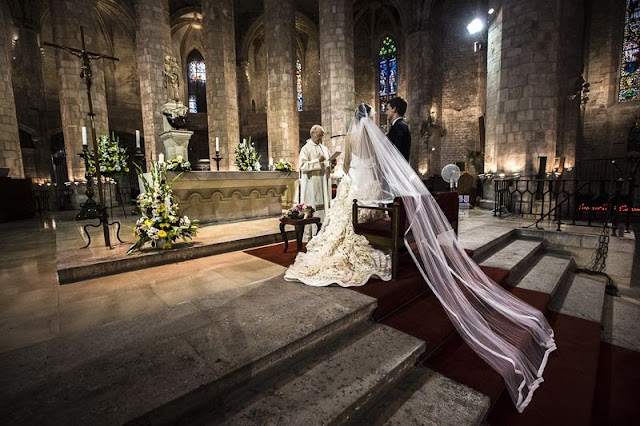Apropos of yesterday's letter about passion--oh dear, the Romantics, so irresponsible, so damaging to the lives of the simple, poor and generally unprotected--I thought I would riff on reason.
A lot of us are in love with love. I want to say "especially when we are young" but I have to admit that I was in love with love long after I felt I was too old for World Youth Day.
There are many problems with being in love with love. First of all, we think of love as a
feeling when love is actually an act of will, governed by reason, helped along by feeling. It is very dangerous to invest so much of ourselves in a feeling because feelings, although strong, are erratic. They are laughably influenced by brain chemistry. Second, we may use men as a means to an end, sources of "love", rather than getting to know them as actual
people just as complex as ourselves. Third, this leads to ignoring all kinds of inconvenient truths about individual men because too much meditation on those inconvenient truths might kill our love-buzz.
Thomas Aquinas writes in the
Summa Theologiae about properly ordered love. If you are of a romantic cast of mind, I recommend reading the whole section on Charity, because it will interest you and yet blow your mind. Love, for Thomas, is totally rational, and he ponders such questions as to whether you ought to love your father more than your mother, or your spouse more than your parents. And he thinks you ought to love people not just according to natural law but insofar as they are
good. In fact, Thomas seems to work himself into a corner when he ponders whether or not you should love your family more than the saints. (If I remember correctly, he encourages you to pray that your family
become saints.)
Hang onto this idea about loving people because they are good while I say something about the French.
The French--
France French, not Canadian French--have a reputation for romantic love. But at the same time, they are extremely serious about marriage as something quite apart from romantic love. Honestly, French romantic love is HERE, and French marriage is THERE, which is probably why the French, secular and Catholic, have taken to the streets in their hundreds of thousands to protest the current assault against traditional marriage. Romance is fun. Marriage is serious.
The French have a number of awesome proverbs about romantic love. My current favourite, as I am studying Polish, is "
L'amour sans jalousie, c'est comme un polonais sans moustache." Ah ha ha! But a more telling one is "
L'amour dure trois ans," which is what the French say (or said) to remind themselves not to go crazy in their choice of a spouse, since a spouse
dure á mort and determines your social standing. To paraphrase a French character in a Nancy Mitford novel, "Two years of completely blissful happiness do not compensate for a lifetime at the wrong end of the [dinner party] table." *
Nor would it compensate for a lifetime with a man who is so crashingly boring or nasty that your friends stop inviting him to parties or even drop you because they can't take the pain of seeing wonderful you with such a character. But the interesting thing is that women fall madly in love with crashingly boring or nasty men all the time and insist upon marrying them, and the scales fall from their eyes only later.
Classical Catholic anthropology places the flourishing of human beings in properly ordered reason. It divides the human mind into intellect, will, passions and connations. (Feeling like a goose walked over your grave is a connation.) Your intellect is supposed to inform your will, and most definitely be in charge of your passions and connations. Intellect and will work together like a king and queen (or queen and prince consort), and the passions are their trusty courtiers, adding dash and panache to their royal lives. For the passions to be in charge is
all wrong.
Now, I am a westerner, so of course I think romantic passion is necessary to marriage, especially the beginning. However, I think even romantic passion should be ruled by King Intellect (or Queen Intellect) and Queen Will (or Prince Will, no pun intended). Because if you fall in love willy-nilly, and end up marrying some guy just because he turns your knees to water, in three years you may find yourself, to your great surprise and disappointment, married to the Wrong Man. Except he's not the Wrong Man, if you are sacramentally married to him. Unless the Church says otherwise, he's
your man, and you're stuck with him--to pray for and be faithful to, if you really can't live with him.
But the thing is, if you marry a man not just because he turns your knees to water, but because you sincerely admire him--and your friends and family get why you admire him, and perhaps they greatly admire him, too--in three years, when your brain is defogged of irrational passion, you think, "Hey! This is great! I am married to
this great guy. Okay, he's not perfect, but I have to admit, I really respect the dude. He's smart. He's hardworking. He's funny. He's [X] with the kids. He looks great in a suit. I can take him anywhere--well, almost anywhere, maybe not to Aunt Martha's place--and feel proud, plus have a pretty decent chat about it afterwards."
This state of affairs is
not an accident. It is
not something beyond your control. It depends on your faith in your reason and learning to love men not
because they are handsome, dashing, the life of the party, a sexy rebel, etc., but because they are
good.
*Mitford fans will be delighted to know that the sort of ancestor-conscious, society-worshiping, place-in-the-country Frenchmen and Frenchwomen Nancy wrote into her novels still exist.











































































